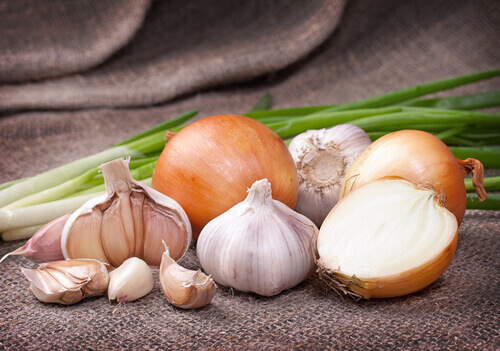7 Natural Remedies for a Scratchy Throat


Written and verified by the doctor Nelton Abdon Ramos Rojas
You can’t miss the natural remedies for a scratchy throat we’re about to recommend here. Keep in mind that this symptom is usually the first indicator that you have a sore throat, which, in turn, could have different causes. Let’s look at it.
Causes of a scratchy throat
There are different possible causes for a scratchy throat, including:
- A virus
- Consuming irritating substances
- Ingesting menthol containing substances
- Smoking
- Frequent coughing
Now that you know what might be the causes of your discomfort, you can try to relieve the symptoms with the following simple natural remedies against itchy throat.
You may also be interested in 5 Ways Onions Can Help You Get Rid of a Cough
7 natural remedies to soothe a scratchy throat
These natural remedies for itchy throat work in many cases. However, they’re a mere complement and not a substitute for medical treatment.
1. Salt and warm water

Ingredients
- 1/2 c. of warm water (125 ml.)
- 1 tbsp. of salt (10 g.)
What to do?
- Add the salt to the warm water and stir until completely dissolved
- Gargle for about 15 to 20 seconds to moisturize your throat, and then spit it all out
2. Licorice
Licorice is actually very effective at relieving a scratchy throat caused by a cough. It’s flavor is sort of a sweet and sour anise so it’s a popular condiment. Furthermore, it’s also an ingredient in pipe tobacco and that for hookahs.
Moreover, it’s an effective natural remedy to relieve itchy throat caused by coughing, as it helps eliminate dryness and moisturize the mucous membranes.
Ingredients
- 10 drops of licorice extract
- 1 glass of warm water (200 ml.)
What do I do?
- To make this remedy, mix the two ingredients together and let it sit for a few minutes.
- Then either gargle it or drink it like a tea, as you prefer. Either method is of equal effectiveness.
3. Onions and garlic

It is well-known that both onions and garlic have many healing powers due to their decongestant and expectorant effects. Consequently, they are an effective natural remedy for some of the causes of an itchy throat.
Ingredients
- 1 c. of water (250 ml.)
- 2 slices of raw onion
- 2 garlic cloves
What do I do?
- Heat the water in a small pot, and as soon as it begins boiling, add the onion slices and mashed garlic cloves
- Let it cook for five minutes and remove it from the heat
- Finally, let steep a few minutes and then drink it, let it cool down so as not to yourself
4. Lemon and honey

Two other ingredients with antiseptic and moisturizing properties perfect for your throat are lemons and honey.
Both have antibacterial qualities that help disinfect the area and put an end to the scratchy throat caused by a virus.
Ingredients
- The juice of 1 lemon
- 1 tsp. of honey (7.5 g.)
What do I do?
- Squeeze the lemon and pour the juice into a small pot
- Heat it a bit on low heat and then add the honey, constantly stirring with a wooden spoon
- Remove from heat and let sit for a few minutes
- Have the syrup every morning before breakfast
Besides soothing a scratchy throat and helping it feel better, your immune system will also be strengthened thanks to the vitamin C.
5. Ginger
This root has several properties and its uses and applications are many and varied. You can use it to add a flavor to your dishes and even make beverages like ginger beer.
It’s quite good for your health due to its antibacterial and antiviral properties. This is why it’s commonly used in a variety of tonics and home remedies to relieve sore throats and symptoms of the common cold.
Ingredients
- 20 grams of fresh ginger (grated or chopped)
- 1 c. of hot water
- 1 tsp. of honey
- Optional: lemon
What should you do?
- Bring the water to a boil
- Then, when it reaches boiling point, add the ginger
- Leave it for ten minutes and remove from heat
- Then, wait for it to rest for a while before drinking it
- You can drink it like this or add honey and lemon, if you don’t like the taste
- Finally, drink it once or twice a day at most
6. Aloe vera
As you may already know, a sore throat may be due to inflammation in the tonsils, or caused by an infection. Furthermore, aloe vera is a common effective remedy, given its anti-inflammatory and bactericidal properties.
Ingredients
- Aloe vera
- Water
- Salt
How to make it?
- Firstly, take an aloe vera stalk and cut it
- Then, rinse it
- Add a touch of salt
- Finally, use this preparation to do gargles twice a day
7. Turmeric with milk
Another natural remedy to control itchy throat has a turmeric base. As you may already know, this root has recognized antibacterial properties. Thus, it’ll help you to clean that area.
Ingredients
- Milk (250 ml.)
- 1 tbsp. of honey
- Grated turmeric or turmeric powder (5-10 g.)
How to make?
- Firstly, mix all ingredients in a blender
- You may strain it if you use grated turmeric
- Then, drink one glass a day
Should you consult a doctor for a burning or scratchy throat?
We love these natural remedies for itchy throat because they don’t usually cause side effects. Also because they’re simple and easy to make at the comfort of your home and without spending a fortune.
However, keep in mind that you should consult your doctor in any of the following situations:
- The discomfort doesn’t go away in a few days or even a week
- The pain or itching doesn’t improve, and worsens
- Also, if there’s severe pain when swallowing
- There’s a high fever
- Finally, there’s nausea, vomiting, or other gastric discomforts
A doctor must determine the best treatment to follow, and also tell you whether or not you can use these natural remedies for a scratchy throat.
All cited sources were thoroughly reviewed by our team to ensure their quality, reliability, currency, and validity. The bibliography of this article was considered reliable and of academic or scientific accuracy.
- Addey D, Shephard A. Incidence, causes, severity and treatment of throat discomfort: a four-region online questionnaire survey. BMC Ear Nose Throat Disord. 2012 Aug 10;12:9. doi: 10.1186/1472-6815-12-9.
- Albaridi NA. Antibacterial Potency of Honey. Int J Microbiol. 2019 Jun 2;2019:2464507.
- Arbab S, Ullah H, Weiwei W, Wei X, Ahmad SU, Wu L, Zhang J. Comparative study of antimicrobial action of aloe vera and antibiotics against different bacterial isolates from skin infection. Vet Med Sci. 2021 Sep;7(5):2061-2067.
- Chan TV. The patient with sore throat. Med Clin North Am. 2010 Sep;94(5):923-43.
- López Luengo, M. T. (2007). El ajo. Offarm, 26, 78–81. Retrieved from http://www.elsevier.es/es-revista-offarm-4-articulo-el-ajo-13097334
- McNally D, Simpson M, Morris C, Shephard A, Goulder M. Rapid relief of acute sore throat with AMC/DCBA throat lozenges: randomised controlled trial. Int J Clin Pract. 2010 Jan;64(2):194-207.
- Ulloa, J. A., Mondragón, P. M., Rodríguez, R., Reséndiz, J. A., & Rosas-Ulloa, P. (2010). La miel de abeja y su importancia. Revista Fuente, 2(4), 11–18.
- Wang, Y. H., Yang, C. P., Ku, M. S., Sun, H. L., & Lue, K. H. (2009). Efficacy of nasal irrigation in the treatment of acute sinusitis in children. International Journal of Pediatric Otorhinolaryngology. https://doi.org/10.1016/j.ijporl.2009.09.001
- Williamson S, Dennison L, Greenwell K, Denison-Day J, Mowbray F, Richards-Hall S, Smith D, Bradbury K, Ainsworth B, Little P, Geraghty AWA, Yardley L. Using nasal sprays to prevent respiratory tract infections: a qualitative study of online consumer reviews and primary care patient interviews. BMJ Open. 2022 Jun 30;12(6):e059661.
- Miguel, M. G., Antunes, M. D., & Faleiro, M. L. (2017). Honey as a complementary medicine. Integrative Medicine Insights. https://doi.org/10.1177/1178633717702869
- Paul IM, Beiler J, McMonagle A, Shaffer ML, Duda L, Berlin CM Jr. Effect of honey, dextromethorphan, and no treatment on nocturnal cough and sleep quality for coughing children and their parents. Arch Pediatr Adolesc Med. 2007 Dec;161(12):1140-6.
- Alarcón Galleguillos María, Fernández Da Silva Rafael. Aplicación terapéutica del Aloe vera L. en Odontología. (2013). Salus, 17(3), 42-50.
- Satomura K, Kitamura T, Kawamura T, Shimbo T, Watanabe M, Kamei M, Takano Y, Tamakoshi A; Great Cold Investigators-I. Prevention of upper respiratory tract infections by gargling: a randomized trial. Am J Prev Med. 2005 Nov;29(4):302-7.
- Tomotake H, Koga T, Yamato M, Kassu A, Ota F. Antibacterial activity of citrus fruit juices against Vibrio species. J Nutr Sci Vitaminol (Tokyo). 2006 Apr;52(2):157-60.
- Torres R., Eugenio; Moreno S., Rogelio; Tamayo V., Yosvel; Hermosilla E., Robinson; Guillén G., Zonia. (2014). Estudio de la actividad antibacteriana del aceite esencial de los rizomas de Curcuma longa L. Química Viva, 13(2), 123-129.
- Wang X, Shen Y, Thakur K, Han J, Zhang JG, Hu F, Wei ZJ. Antibacterial Activity and Mechanism of Ginger Essential Oil against Escherichia coli and Staphylococcus aureus. Molecules. 2020 Aug 30;25(17):3955.
- Guillamón, Enrique. (2018). Efecto de compuestos fitoquímicos del género Allium sobre el sistema inmune y la respuesta inflamatoria. Ars Pharm vol.59. Disponible en: https://scielo.isciii.es/scielo.php?script=sci_arttext&pid=S2340-98942018000300185
-
Siedentopp, U. (2008). El regaliz, una planta medicinal eficaz para la tos y las afecciones de estómago. Revista Internacional de Acupuntura. Disponible en:https://www.sciencedirect.com/science/article/abs/pii/S1887836908756187
This text is provided for informational purposes only and does not replace consultation with a professional. If in doubt, consult your specialist.








